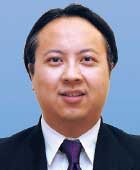Patients’ Stories Led to Unusual Career Path
Abstract

John Luo, M.D., is a health science clinical professor in psychiatry and director of the psychiatry residency program at the UC Riverside School of Medicine. He is also an expert on psychiatry and informatics and a member of APA’s Council on Communications.
Reflecting on how I became a psychiatrist, there were a series of opportunities as well as interactions with mentors who have helped shape my career. I first attended the California Institute of Technology with the goal of getting a Ph.D. in biology and pursuing research in immunology. Suffice it to say, after two summers spent doing research, I decided I wanted more human interaction and less lab bench time, so I transferred to UCLA with the plan to go to medical school.
I thought that I would follow in my father’s footsteps and become a primary care provider. I saw how much he had sacrificed time with the family to provide comprehensive care for his patients, whether seeing them at his clinic or at the hospital and rounding on them on the weekends. What impressed me was how much they appreciated his dedication to their care, and I wanted to have that same experience. I also wanted to have a better work-life balance, since I remember all too well the many weekends waiting for hours in the hospital parking lot for my father to finish rounding on his patients. Keep in mind, this time was well before the advent of smartphones and portable gaming systems to keep me entertained!
At the University of Texas Medical Branch, it was during my third-year clerkship in psychiatry on the consultation-liaison service that I discovered why I aspired to become a psychiatrist. Even though I was a medical student, just by listening to my patients and having empathy with their stories, I was able to have a significant impact. I learned that for patients with severe mental illness, a psychiatrist is often their primary care provider, and I found the relationship with my patients as engaging and rewarding as my father had with his patients. My choice to pursue a psychiatry residency was also influenced by the need to reduce the stigma of mental illness in Asian communities.
It was during residency that I was fortunate to be an APA-Center for Mental Health Services Minority Fellow, which provided the next fork in the eventual path of my career. As a resident member of the Committee of Asian-American Psychiatrists, I served on the Committee on Information Systems. My initial plan was to create a webpage of resources in 1996 to help address the access issue to mental health services for minority populations, but I learned that many of my resident colleagues, faculty, and APA members didn’t even know what the internet was back then. I realized that my technical skills and early adoption of various technologies could help improve patient care by educating my colleagues on how to use technology appropriately in the practice of psychiatry.
I feel very fortunate in this journey to become a psychiatrist, informaticist, and educator. My goal has been to provide excellent patient care just like my father, yet I discovered my own path. It has been a privilege to provide care to my patients as well as educate my colleagues to enable them to use the various technology tools in patient care. As I reflect on my career so far, I couldn’t imagine it to be any better! ■
Psychiatric News invites you to share your story of why you chose a career in psychiatry. If interested, please send an email to [email protected].



